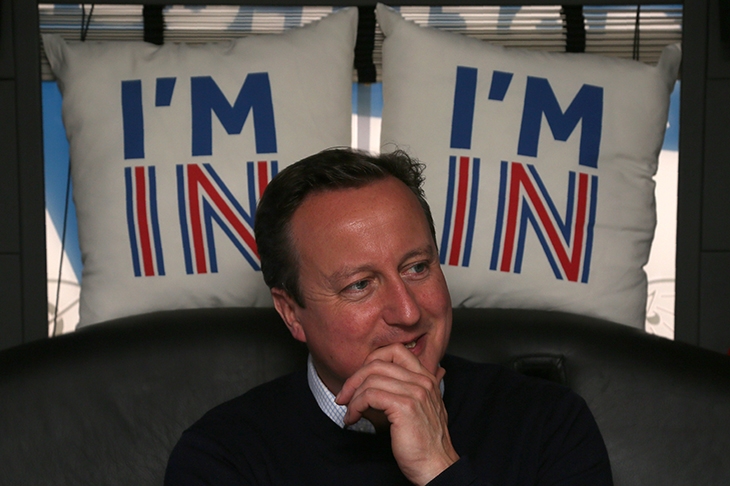All Cameron’s fault
Sir: In this time of febrile political speculation, there can have been few more arresting subject headings on your Letters page than ‘Not Cameron’s fault’ (6 April). Your correspondent Mike Jeffes added to the sense of unreality by writing that ‘Cameron did nothing wrong’. You need to be neither a Remainer nor Brexiteer to follow in horror the painful result of Cameron’s opening of this Pandora’s Box in 2016. In the 2010 and 2015 elections, the subject of Europe was well down on the list of voter concerns, but with a mixture of hubris, stupidity, and narrow political interest, Cameron’s decision to call the referendum has driven us into this political quagmire. Even more extraordinary is his claim in January that he has no regrets over calling the referendum. Most people in the UK would beg to differ.
Leslie Buchanan
Barcelona
Hostility to Ireland?
Sir: Congratulations on your having presided over 500 editions of the Spectator. As a reader of the magazine since the early 1980a, I have seen many fine articles which meet your stated aims to ‘inform, to entertain and to make people think’.
However, I regret to say that when it comes to Ireland, with the occasionally exception, these laudatory objectives are rarely met. I am not unduly thin-skinned but, over the last couple of years, the prevailing tone and tenor of most Spectator articles relating to Ireland have been snide and hostile – Robert Hardman’s polemical piece about Ireland’s observer status at La Francophonic being an egregious example. While 17 EU Member States are either members of observers of this international organisation, only Ireland’s affiliation incurs his scorn.
Brexit has undeniably placed some pressure on British-Irish relations, Nevertheless, most British people I meet understand the rationale underlying the Irish Government approach to Brexit; a policy which enjoys cross-party support in our parliament and across public opinion in Ireland, In a minority of cases, criticism of that approach has lapsed into an anti-Irish sentiment which we all hoped had been consigned to the past.
Most popular
Britain’s asylum crackdown is making Ireland panic
I suspect recognition of this latent tendency will be the reaction of many readers to Mr Hardman’s article – not one of being informed entertained or encouraged to think.
Adrian O’Neill
Irish ambassador to the UK, London SW1
Shrinking horticulture
Sir: Charles Moore refers to unharvested daffodils as ‘stranded refugees’ (The Spectator’s Notes, 30 March). We are growers of garden plants and employ significant numbers of eastern Europeans who by and large are hardworking and decent people. However, we are now struggling to find the number of workers we need; and we are not alone. The vast majority of UK vegetables, fruit, flowers and plants are harvested and packed by eastern Europeans. I know of a number of growers who are taking areas out of production through shortage of labour, which will result in less homegrown produce in our supermarkets. It is also likely to result in crops rotting in the fields or greenhouses. I suspect even the most ardent Brexiteer may regret the shrinking of our horticultural industry.
Jeff Hooper
Toddington Nurseries, West Sussex
Trans language
Sir: How is it that Ipso can force your publication to use terminology favoured by the trans lobby in your ‘clarification’ (23 March)? The terminology of that lobby represents nothing more than their own fanciful beliefs, has no basis in biology and little support in society at large; I was deeply saddened to see it given credence in a serious publication such as
The Spectator. When nasty shouty lobbyists try to force others to obey them, we must not give in.
S.M. Montgomery
Cottenham, Cambs
What’s up with GPs?
Sir: J. Meirion Thomas asks why it is that UK-trained doctors are leaving the NHS, without mentioning GPs. The GP used to embody the ideal of a medical doctor: a trained and respected professional who knows about life and death, someone in the community you can turn to for help. GPs surely still have important powers of referral to specialist services. Thousands of graduates aspired to this profession, and until recently there seems to have been no shortage of eager applicants. So one of the questions Meirion Thomas ought to have considered was: what is happening to GPs?
Jon Geidt
Cape Town, South Africa
India’s imperialism
Sir: In acknowledging post-colonial guilt, William Dalrymple asks us to perceive how others see us. If only those critics could ever see themselves (Books, 6 April). The Amritsar massacre of 1919 was a failure, but how many more families were affected by the Amritsar massacre of 1984? More people were killed by the Indian republic in ‘Operation Blue Star’ than by Dyer in 1919 — and thousands more Sikhs were killed in pogroms perpetrated with the connivance of the Indian National Congress in 1984.
India has its own record of imperialist crimes. Modern India was scarcely months old when it invaded the independent principality of Hyderabad: 200,000 people were killed in a naked act of territorial aggression. In 1975, India also subjected the principality of Sikkim to military occupation and annexation, and from Khalistan to Assam has suppressed multiple regional independence movements with a bloodiness that makes the Troubles look like a playground scuffle. Apologies from Britain for crimes caused during the Raj should only be forthcoming when modern India is forced to make amends for its own neocolonial atrocities.
Robert Frazer
Stockport, Cheshire
A bad meal
Sir: I defy anyone to invent anything as disgusting as my mother’s rhubarb curry in the meatless years after the second world war (Letters, 6 April). We ate it… once.
Isabel Gordon
Kelso, Scotland






Comments